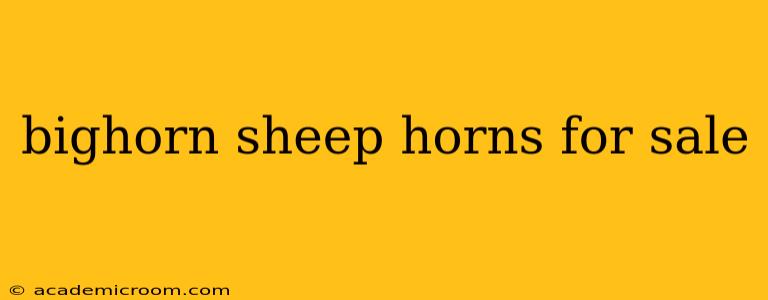The sale of bighorn sheep horns is a complex issue, steeped in legal regulations and ethical considerations. Before even considering purchasing bighorn sheep horns, it's crucial to understand the laws surrounding their acquisition and the conservation efforts aimed at protecting these majestic animals. This guide will delve into the intricacies of this market, addressing common questions and concerns.
Are Bighorn Sheep Horns Legal to Sell?
The legality of selling bighorn sheep horns varies significantly depending on several factors, including the species of sheep, the source of the horns (e.g., naturally shed, harvested from a legally hunted animal), and the governing jurisdiction. In many regions, the sale of bighorn sheep horns is heavily restricted or entirely prohibited to protect these vulnerable animals from poaching and habitat destruction. It is crucial to check the specific laws in your state or country before engaging in any transaction involving bighorn sheep horns. Violating these laws can result in severe penalties, including hefty fines and imprisonment.
Where Can I Find Bighorn Sheep Horns for Sale?
Authentic bighorn sheep horns from legal sources are rarely found for sale openly. Legitimate vendors are often associated with wildlife auctions or have specific permits allowing them to sell horns legally obtained (often from animals that died of natural causes or were harvested legally through hunting programs). Beware of sources offering horns without clear provenance or documentation. Such sales likely involve illegally obtained horns, contributing to the illegal wildlife trade, a serious threat to bighorn sheep populations.
What is the Price of Bighorn Sheep Horns?
The price of bighorn sheep horns varies dramatically depending on several factors: size, curl, condition, and, most importantly, legality of acquisition. Larger, more dramatically curved horns in excellent condition will command significantly higher prices. However, the price should never outweigh the importance of ensuring the horns were obtained legally and ethically. Unlawful acquisition undermines conservation efforts and jeopardizes the survival of bighorn sheep.
What Should I Look For When Buying Bighorn Sheep Horns?
When considering purchasing bighorn sheep horns (only from legitimate and verified sources), ensure you have:
- Documentation proving legal acquisition: This is paramount. The documentation should clearly state the source of the horns and compliance with all relevant laws.
- Verification of authenticity: The horns should be examined carefully for any signs of alteration or manipulation.
- Information on the species: Confirm the exact species of bighorn sheep the horns are from.
Are There Ethical Concerns Surrounding the Sale of Bighorn Sheep Horns?
Yes, ethical concerns are central to the discussion surrounding the sale of bighorn sheep horns. The illegal trade in wildlife products fuels poaching and habitat destruction, endangering bighorn sheep populations and the biodiversity of their ecosystems. Supporting this trade directly contributes to the decline of these magnificent animals. Ethical consumers prioritize purchasing only from sources that ensure sustainable practices and strict adherence to the law.
How Can I Contribute to Bighorn Sheep Conservation?
Instead of purchasing bighorn sheep horns, consider supporting organizations dedicated to bighorn sheep conservation. These organizations work tirelessly to protect bighorn sheep habitats, monitor populations, and combat poaching. Your contribution can make a tangible difference in the survival of these incredible animals.
Disclaimer: This information is for educational purposes only and does not constitute legal advice. Always consult with relevant authorities to determine the legality of buying or selling bighorn sheep horns in your specific jurisdiction. Remember that supporting illegal wildlife trade has severe consequences for both the animals and the environment.
